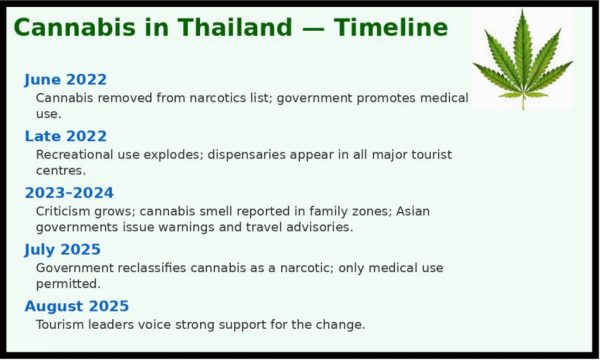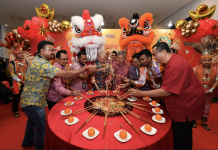BANGKOK, 14 August 2025: Thailand’s decision to reclassify cannabis as a narcotic, just three years after legalising it, has been broadly welcomed by senior tourism leaders, who believe the move will strengthen the country’s reputation as a safe, family-friendly destination.
Cannabis was removed from the narcotics list in June 2022, positioning Thailand as the first Asian Nation to permit its use. While the policy aimed to promote medical research and wellness tourism, lax regulation quickly turned it into a booming recreational market. Dispensaries sprang up in Bangkok, Pattaya, Phuket, Chiang Mai, Hua Hin, and Koh Samui, and the smell of marijuana became a common feature of busy tourist zones.

As I observed earlier this year in a report posted by Travel Daily News, “the pervasive smell of drug odour throughout key tourist spots had a negative effect and was a concern, particularly for family tourism.” Families, especially from conservative Asian markets, began expressing discomfort, while several governments issued travel warnings or cautions to citizens.
Positive response from tourism leaders
In a Nation Online report, Thai Hotels Association President Thienprasit Chaiyapatranun said the policy reversal “had a positive impact” on Thailand’s core markets. “Tourists who do not use cannabis often feel unsafe in environments where its smell is pervasive. This discourages families with children from visiting urban areas”.
Association of Thai Travel Agents (ATTA), Secretary-General Adith Chairattananon noted in the same Nation report that the Asia–Pacific region accounts for 70% of Thailand’s inbound visitors. He added that travellers from South Korea and China have faced random drug tests upon returning home after visiting Thailand, a practice he warned could undermine tourism partnerships and discourage future travel.
ATTA President Thanapol Cheewarattanaporn agreed, pointing out that major source markets, including China, Hong Kong, Singapore, Malaysia, Indonesia, Australia, and Taiwan, have little tolerance for recreational cannabis. Restricting use to medical purposes, he argued, will restore Thailand’s image and align it with the preferences of its largest visitor geo-markets.
Balancing Risks and Opportunities
The Association of Thai Tourism Marketing (ATTM) president, Kitti Pornsiwakit, acknowledged that the new rules could result in closures or costly adjustments for over 20,000 cannabis-related businesses. However, he emphasised the potential to reposition Thailand as a premium medical cannabis wellness hub.
Blending controlled cannabis use into spa, rehabilitation, and health retreat tourism. “It aligns with the original medical-use intention and addresses concerns over cannabis contamination in food while supporting family tourism,” he said.

This measured approach, industry leaders believe, could allow Thailand to preserve a limited cannabis tourism niche without compromising its broader market appeal.
A step towards a tourism blueprint
The policy change mirrors priorities set out in my earlier article, Thailand Tourism 2025–2030: Strategic Pathways to Growth and Sustainability, which called for greater focus on quality tourism, sustainable growth, and protecting the country’s family-friendly image. Limiting street-level cannabis sales reduces deterrents for premium and long-stay travellers while still leaving room for specialised, licensed cannabis experiences in a medical context.
Looking Ahead
The government now faces the challenge of enforcing the new rules, supporting affected entrepreneurs, and communicating the change clearly to international markets. The tourism sector hopes that by restoring a cleaner, safer atmosphere in key destinations, Thailand can capitalise on rising family and wellness travel demand, both critical to its long-term competitiveness.

About the Author
Andrew J Wood is an internationally recognised travel writer, consultant, and former hotel general manager with over 40 years of experience in the hospitality and tourism industry. Based in Thailand since 1991, he is an international hospitality commentator for various online travel publications and a past President of Skål International Bangkok, Thailand and Skål Asia.






